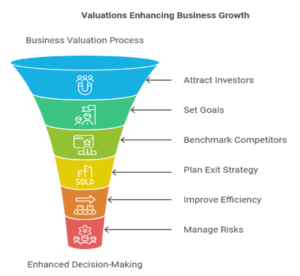Valuations play a pivotal role in scaling your business. Whether you’re preparing for funding, strategic planning, or mergers and acquisitions, understanding the true worth of your company gives you valuable insights for decision-making and growth. A business valuation isn’t just a financial number; it’s a reflection of your company’s potential, risk, and opportunities in the market.

1. Attracting Investors and Raising Capital
One of the primary reasons startups and growing companies seek a business valuation is to attract investors or raise capital. When you know your company’s worth, you can clearly communicate that value to potential investors. This valuation helps you justify your funding needs and negotiate more effectively. Investors use these reports to assess the risk and return on their investment.
Key Consideration:
Valuations provide credibility and transparency. For instance, when seeking venture capital (VC), a clear valuation can show your startup’s growth potential, reducing the perceived risk for investors.
2. Setting Realistic Goals and Milestones
Scaling a business requires setting realistic goals and assessing your progress. Valuations help you understand your company’s market position, cash flow situation, and potential growth trajectory. Whether you are planning for a new product launch, expanding into new regions, or optimizing existing operations, a professional valuation can guide your growth strategy.
Example:
A tech startup, for example, may rely on valuations to assess its product-market fit, customer acquisition costs, and lifetime value per customer (LTV). This allows the company to plan its expansion with realistic financial goals.
3. Benchmarking Against Competitors
Valuations allow you to benchmark your business against competitors, helping you identify areas where you are ahead or behind. This data can inform both short-term tactics and long-term strategies, enabling you to make data-driven decisions.
Example:
If a competitor is valued higher despite similar business models, it may indicate areas for improvement in operations, customer engagement, or financial structure. A valuation report helps you identify these gaps and take corrective actions.
4. Exit Strategy Planning
For business owners looking to exit their companies—whether through a sale, merger, or public offering—a valuation is crucial for setting the right price. An accurate valuation helps you understand the market value of your business, ensuring you don’t undersell your business or set unrealistic expectations.
Example:
An SME looking to sell to a larger competitor will rely on a business valuation to understand its market position and negotiate an appropriate selling price. Proper valuation also helps ensure that the transition is smooth and both sides benefit from the deal.
5. Improving Operational Efficiency
A business valuation assesses not only your financials but also operational elements like intellectual property, customer base, employee talent, and management structure. This holistic evaluation can highlight inefficiencies and opportunities for cost-cutting or investment.
Example:
A manufacturing company might find that its inventory management system is costing more than it should, or that its labor efficiency needs to be improved. A valuation report identifies these inefficiencies, enabling better allocation of resources for scaling.
6. Risk Management
Valuations also provide insights into risks associated with business scaling. Whether it’s financial instability, reliance on a few key customers, or emerging competition, knowing your company’s worth in the current market helps you mitigate potential risks as you grow.
Example:
For a service-based company scaling rapidly, a valuation might highlight dependency on a small client base. This information can lead to diversification strategies, like expanding into new verticals or securing long-term contracts.
7. Improved Decision-Making
In scaling your business, decisions related to hiring, marketing, product development, or geographical expansion are essential. A clear understanding of your company’s valuation enables you to make informed decisions based on facts rather than assumptions.
Example:
A startup looking to hire more employees for expansion can use valuation insights into its financials to set realistic salary expectations, establish hiring budgets, and ensure that scaling operations remain financially sustainable.
Conclusion
Business valuations are not only crucial for external financing but are an essential tool for internal decision-making and scaling operations. With the insights gained from a comprehensive valuation report, you can strategically plan for growth, identify risks, and optimize your company’s value in the long run. Whether you are a startup or an SME, the value of understanding your company’s financial health cannot be overstated.










